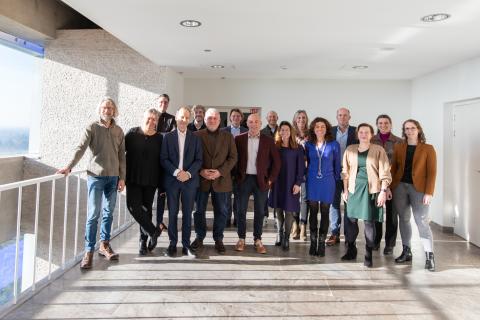“This clearly shows what we’re good at.”
Academic Collaborative Centers are a union between the university and social practice, an innovation the university is fully committed to and in which the Academic Collaborative Center Broad Prosperity plays a key role as a meeting place, just like the open space at the heart of the Warande forest park.
Tilburg University is no stranger to the phenomenon of Academic Collaborative Centers: Tranzo, the scientific center for care and well-being of the Tilburg School of Social and Behavioral Sciences, is home to eleven of them. This has familiarized our organization with a way of working that enables science in close collaboration with social actors. And it has clearly given the university a taste for more: in its new strategy, Tilburg University commits to launching university-wide Academic Collaborative Centers. These new centers target four themes – Broad Prosperity, Inclusive Labor Market, Climate & Energy Transition, and Digital Health & Well-being – that align with the strengths and values of the university.
The driving force behind these new centers is Lex Meijdam, the Dean of the Tilburg School of Economics & Management, who insists that Tranzo inspired this innovation. “These new centers are essentially similar to those at Tranzo: we too seek long-term collaboration with social partners on social issues, but the thematic orientation of the university-wide centers is broader than that of Tranzo’s care centers.” The new centers will always involve several Schools, Meijdam explains.
“Major social issues require a multidisciplinary and multidomain approach, and working together with social partners and companies is a crucial component of that approach.”
Science practitioners
In Meijdam’s view, Tranzo sets a good example. “Tranzo has truly succeeded in conducting good science together with partners. That is harder than it looks and sounds. It takes a strong network and the skill to speak the language of professionals in the field, all the while taking care not to compromise research quality.” Just as at Tranzo, the new university-wide Academic Collaborative Centers will seek long-term working relationships with social partners. “Together, we are drawing up a multiyear research agenda, which we will then implement working with, for example, science practitioners – another Tranzo takeaway. These practitioners are professionals who work in the field and do research. The idea is that the partners can learn from scientific knowledge generated in the centers and apply these learnings in practice. Our education also stands to benefit from the Academic Collaborative Centers, for example in the context of new courses or minors relating to the broad societal themes. Also, it is not too much of a stretch to imagine students doing research internships at partner organizations.”
Warande
Thematically, the Academic Collaborative Center Broad Prosperity is the linchpin. To explain, Meijdam uses the image of the Warande, the forest park on the edge of campus. “The park is effectively a square with an open area in the middle. It is there that you’ll find the Broad Prosperity center, with the other themes skirting that open area and being connected with it through paths. That’s how Broad Prosperity connects all themes. At the same time, it is unlike the other themes.” To the world at large, Broad Prosperity is also the face of the phenomenon of Academic Collaborative Centers. Meijdam: “We want to use this theme to tell the common story of this way of working.”
For Tilburg University, Broad Prosperity is a central theme in the coming period, aligning as it does with both the history and the societal DNA of the university. It is also highly relevant. More than ever before, we are facing the limits of economic growth and are beginning to understand that the drive for economic production has become excessive. True social progress will require us to look beyond Gross Domestic Product. We want to know how we can improve in such areas as sustainability and equality. The Academic Collaborative Center Broad Prosperity aims to put flesh on the bones of this notion, enabling governments and organizations to use it in practice.
“The center seeks to address these questions: How can broad prosperity be achieved? How to measure it and what to do with it?”
Commitment
Several investments show that the university means business. For one thing, the chair of the Social and Economic Council (SER), Kim Putters, has been appointed Distinguished University Professor for Broad Prosperity. For another, the university and the City of Tilburg have set up a fund to finance research into broad prosperity in neighborhoods. The Academic Collaborative Centers are fully engaged in mobilizing partners: governments, NGOs, large corporations, and SMBs. The university concludes multiyear contracts with its partners, and these contracts do more than merely state intentions. “The participants are expected to commit themselves, both financially and in terms of human resources. Another potential commitment is making data available.”
The university and its partners financially support the start-up of the centers and their resarch. Other funds are likely to also join as donors. Meijdam: “We’re hoping for a multiplier effect and we believe that’s feasible, given the societal themes the centers address and the focus on impact. These are progressively becoming the objectives of research funding, both domestically and in Europe.”

Visible
As interesting as the innovative Academic Collaborative Centers approach is, it is by no means its only appealing feature. Meijdam expects the centers will benefit the university in many more ways. For example, they could be instrumental in intensifying collaboration between Schools. And through them, the university could increase its external appeal. “They clearly show what we’re good at. That makes it easier to raise funds. And it will be easier for the outside world to see what we can mean to them, as well as the other way round.”
'Weaving Minds & Characters' Strategy Towards 2027
Stay up-to-date on all strategic developments and activities leading up to our 100th anniversary.
